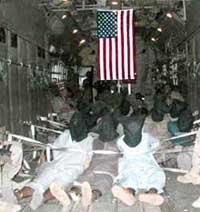The New York Times carried a detailed piece on the U.S. detention policy in Afghanistan on Monday, January 7, 2007. It is an excellent overview on the prison, but the information provided in the piece gives rise to a number of international law issues that are not explicitly discussed or acknowledged in the article itself. I first review the salient facts, and then turn to the issues.
piece gives rise to a number of international law issues that are not explicitly discussed or acknowledged in the article itself. I first review the salient facts, and then turn to the issues.
The facts
It reviewed the history of Bagram Prison and the extent to which it was in many respects worse than the facility in Guantanamo Bay. There are over 600 detainees being held there, most of whom have not been charged with any offence or been subject to any legal proceeding. Some have been held without charge for more than five years. The average detention is over 14 months long. Moreover, while U.S. authorities claim that all detainees are to be processed and “registered” within fourteen days of admission, and thus accessible to the International Red Cross when it visits, they also conceded that there were exceptions. An IRC confidential report, according to administration sources, claims that it has been denied access to a “warren of isolation cells” in the Bagram facility.
But what is more striking from the article is the account of how the U.S. Defence Department officials applied pressure on the Karzai administration to establish a regime of indefinite detention of “enemy combatants” along the lines of the so-called legal framework of Guantanamo Bay. President Karzai refused to sign the decree drafted with U.S. assistance to authorize and establish the regime.
A 2005 agreement to transfer the bulk of detainees to Afghanistan was the basis for a more detailed plan of transfer, as outlined in an exchange of diplomatic notes. The notes reflect that the U.S. sought to have the Afghanistan government share any intelligence obtained from detainees, to “utilize all methods appropriate and permissible under Afghan law to surveil or monitor their activities following any release,” and “confiscate or deny passports and take measures to prevent each national from travelling outside Afghanistan.”
